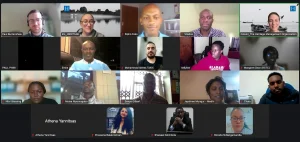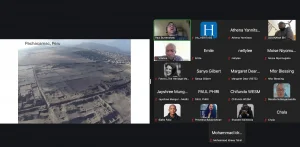HERITΛGE Workshop on Community and Economic Development
HERITΛGE recently hosted an online workshop on Community and Economic Development, bringing together 20 heritage managers from 16 countries across Africa and Asia. The three-day intensive training aimed to strengthen participants’ understanding of how cultural heritage can be mobilised for sustainable economic benefit while supporting community development.
The programme was designed to provide heritage managers worldwide with a firm understanding of the motivations for mobilising cultural resources for economic benefit, the limits of that mobilisation, different strategies for creating economic benefits, and how economic impacts are measured and communicated. Participants were guided through the process of developing plans for their own case studies, including goal setting, strategy selection, assessing economic feasibility, and establishing monitoring and evaluation procedures.
The workshop was led by Dr Paul Burtenshaw and Athena Yannitsas. Dr Burtenshaw is a specialist in heritage economics, heritage tourism, and the relationship between cultural heritage and sustainable community development. He has worked on heritage and tourism projects in a range of countries, focusing on how economic approaches can support long-term preservation and local benefit. Athena Yannitsas, Intercultural Initiatives Manager at HERITΛGE, works on programme development, training facilitation, and cross-cultural collaboration. Her work helps align HERITΛGE’s activities with the cultural contexts of diverse communities. Together, they guided participants through a structured and practical learning process linking economic concepts with real-world application.
The Tutor’s approach to stimulate “Thinking outside the box” ideas among participants to brainstorm, identify, develop, scale-up and enhance economic resilience and profitability of the Cultural Heritage.
Paul Phiri / Executive Director at PAZESA Horticultural Community
In total, the course involved 18 capacity-building cases and 19 case studies across two continents, with participants representing a wide range of organisations from Afghanistan, Cameroon, Egypt, Ethiopia, Eswatini, Kenya, Lesotho, Malawi, Malaysia, Mauritius, Niger, Nigeria, Rwanda, South Africa, Uganda, and Zambia.
Throughout the workshop, participants examined how cultural heritage can serve as an economic asset while ensuring that local communities benefit directly. Sessions covered the main sources of income in heritage, such as public funding, donations, and commercialisation, and discussed approaches to integrating sustainability within these models. A particular focus was placed on addressing local needs and priorities, including job creation, cultural preservation, and youth engagement.
Participants also explored ways to generate economic impact through cultural tourism and artisan production, analysing both the opportunities and challenges of these approaches. Further sessions addressed business viability and sustainability, including market-driven product development, audience segmentation, and the five Ps of marketing. Practical exercises on costing and financial planning helped participants assess the feasibility of their proposed initiatives.
Paul was such a great instructor, got me thinking about many things, especially in skills development, capacity building and governance. Hearing his experiences enriched the course. The session on M&E is particularly something that I have struggled with and I have learnt to keep the tools simple and to invent my own to suit my projects.
Margaret Dear Kasande-Köbel / Crafts Manager at Rwenzori Sustainable Trade Centre Limited
The final part of the training focused on capacity building and long-term sustainability, highlighting the importance of developing skills and confidence within communities to manage heritage enterprises independently. The course concluded with a session on monitoring and evaluation, which covered how to design measurable indicators, track progress, and use data to improve project outcomes.
By the end of the workshop, participants had developed frameworks outlining their project goals, strategies, and measures of success, supporting the implementation of sustainable economic development initiatives in their respective contexts.
For more information about HERITΛGE’s workshops, go to our open courses page, or follow us on Facebook, Twitter / X, LinkedIn or Instagram.


